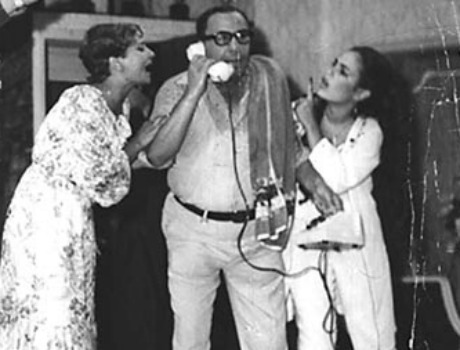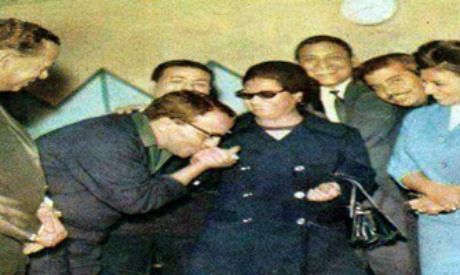Prominent Egyptian film actor Fouad El-Mohandes, who died on 16 September 2006 at the age of 82, was one of Egypt’s most popular film and theatre stars during the latter half of the 20th century.
In 2004, El-Mohandes won the State Appreciation Award in the Arts. The win was a significant milestone for El-Mohandes, who was the first comedic actor to win the award.
Only eight actors had won the award before El-Mohandes; the first was Youssef Wahbi in 1968 and the last was Mahmoud Morsi in 2000.
The difference was that all the other winners were directors or scriptwriters in addition to being actors. El-Mohandes, however, was an actor all the way.
El-Mohandes entered the field of arts supported by a good cultural background which his scholar father Zaki El-Mohandes and his elder sister Safiya El-Mohandes, a pioneering media figure, had helped shape.
Although he started his artistic activity on the university stage, his long years in radio under the pioneer Mohamed Mahmoud Shaaban, also known as “Baba Sharo,” earned him broad experience.
He gave a mesmerising performance on the famous radio programme The Comedy Hour, along with a constellation of talents who shaped the face of comedy in Egypt during the fifties and sixties, including Abdel-Moneim Madbouly and Amin El-Heneidy.
While El-Mohandes gained stage experience in the fifties, his distinctive elements were the standard features of the theatre renaissance of the sixties, at the time of television theatre companies and the beginning of the United Artists Company.
In this period, he met his other artistic half, the actress Shwikar, creating an exceptional comedic blend that has retains its magic even all these years later.
Through their repeated successes, they have established the idea of the comedy couple for the first time.
There were actresses whose names were connected with El-Mohandes’ teacher Naguib El-Rihani, such as Mimi Shekib and Marie Mouneib, but none of them constituted El-Rihani’s other half in his company.
As for El-Mohandes and Shwikar, they combined skilfulness and balanced presence: El-Mohandes’ mastery and comedic sense, and Shwikar’s vivacity and capacity for diversity.

Fouad El-Mohandes and Shweikar (Photo: Al Ahram)
The first to introduce El-Mohandes to cinema screens was Hassan El-Imam, who gave him roles in three films from 1952: Parent’s Anger, Age of Wonders and A Cupful of Pain.
But they were limited participations that went unnoticed. Thus, the real credit for El-Mohandes’ presence on the screen goes to the Zulfikar director brothers.
In 1953 Mahmoud Zulfikar chose El-Mohandes to participate in My Life’s Biggest Fault.
In the next year, Mahmoud Zulfikar gave him his first leading-man role in The Neighbour’s Daughter with Zahrat El-Ola and Shadia.
As for the first collaboration between El-Mohandes and the other brother, Ezz-Eldin Zulfikar was in Wakeful Eyes (1956) with Salah Zulfikar and Shadia.
What’s remarkable is that ten of El-Mohandes’ first 13 films were with the Zulfikar brothers. However, he was often relegated to supporting roles.
Why was El-Mohandes quickly relegated to supporting roles? Did that mean that he had failed in his first leading role, especially as his cinematic participations dwindled in that same period? Following his participation in The Neighbour’s Daughter and The Good Land (both in 1954), he only acted in one more film, Wakeful Eyes (1956), and only began to gain momentum through Among the Ruins (1959), also directed by Ezz-Eldin Zulfikar.
I think that the reason behind this is the predominance of another comedian star, Ismail Yassin. For 1954, the year of Fouad El-Mohandes’ supposedly launch on cinema screens, Yassin’s stardom was at its zenith.
In that year, Yassin formed his stage company, and began a series of films starting with his name. Thus, he became the one and only star comedian until the early sixties.
Ten years after his first leading-man role, Fouad El-Mohandes returned as a star in film posters thanks to the overwhelming success he achieved on stage.
For example, he starred in I, He and She, directed by Fateen Abdel-Wahab, which was adapted from a play with the same title.
In the same year, 1964. Shwikar co-starred with El-Mohandes in three of his four films in which he was the leading man.
Thus the two actors began to establish themselves as a couple on screen after they had done so on stage.
It was a unique phenomenon and its impact extended until the mid-seventies.

Fouad El-Mohandes in the film Shanabou Fil-Masyada (Shanabou in the Trap)
This was due to a number of reasons. The pair was the only comedy couple known in Egyptian cinema, rather than only the stage.
Although Egyptian cinema had witnessed the couples’ phenomenon since the mid-forties, for example with Anwar Wagdi and Leila Mourad, these couples were dominated either by a tragic nature, as was the case with Faten Hamama and Emad Hamdy, or with a musical element, such as Samia Gamal and Farid Al-Atrash.
They were also the only couple made and honed on stage. Hence, they came to the cinema bearing a high risk, for if they have failed, their stage career would have been ruined also.
In the end, the pair became the most successful film couple in Egyptian cinema in terms of number of appearances, featuring in 26 films together.
The couple were also the most durable pairing in terms of their combined experience, which lasted until 1990, when the director Yassin Ismail Yassin brought El-Mohandes and Shwikar together in A Crime Minus a Quarter. That meant that this couple was in demand until the beginning of the nineties.
The impact of this successful couple extended beyond the screen; their presence on the stage continued for many years through a number of memorable plays such as Blithe Spirit, My Fair Lady, Hello Dolly, and Rawhia Has Been Kidnapped.
This also coincided with the couple’s radio successes, as they performed on drama serials that have become classics, and many of which were adapted to film, such as You Are the One Who Killed My Papa.
It seemed that any success they achieved in one medium, whether theatrical, cinematic or radio, promoted further success in other mediums.
The success of the pairing was not dependent on the fact that they were a real married couple; in fact, it continued after the couple’s divorce, unlike other couples such as Anwar Wagdi and Leila Mourad.

Fouad El-Mohandes in the play Sukk 'Ala Banatak (Keep Your Daughters Locked In)
In terms of content, the structure of the couples’ films relied on the theme of the naïve, good-hearted man and the beautiful woman who attracts him, either through her charms or her strong character or both, then pushes him to achieve what she desires.
However, there were variations on the form to create social comedy in films such as A Husband’s Confessions (1964), directed by Fateen Abdel-Wahab, the detective comedy Shanabo in the Trap (1968), by Hossam Eddine Mostafa, The Most Dangerous Man in the World (1967) by Niazi Mostafa, the musical comedy Romantic Chase (1968) by Nagdi Hafez, and the black comedy Land of Hypocrisy (1968) by Fateen Abdel-Wahab.
Fouad and Shwikar tried to politicise some of their films or incorporate some nationalist conceptions within them following Egypt’s defeat in the 1967 war, which was a critical period in Egyptian history.
The tone of triumphing over the West and Americans in particular increased, if only in a farcical framework. We saw Fouad El-Mohandes preferring the Egyptian girl (Shwikar) over all the Western beauties in Romantic Chase, the Egyptian police managing to arrest Mr. X in The Most Dangerous Man in the World, uncover a spy ring in Entry Highly Risky (1969) directed by Niazi Mostafa, as well as the obvious nationalist line in Viva Zalata (1976) by Hassan Hafez.
I don’t think it is just a coincidence that in their films the West is always the other party in the conflict and that Egyptian good-heartedness and innate intelligence triumphs over the elements of evil, regardless of its strength.
It is most likely that those controlling public opinion found in the popularity of this couple a chance to insert these political implications as a kind of relief from the collective depression following the 1967 defeat.
This was the same technique they used, if for another purpose, in Ismail Yassin’s soldiery film series in the fifties.
Although El-Mohandes worked with a number of directors, his films with Fateen Abdel-Wahab remain the most mature and most valuable of them all.
It was these films that established in the sixties what I like to call the family comedy.
This kind of film emerged after the popular comedy faded out, and Fateen found in El-Mohandes the most suitable actor for this kind of comedy, which takes place inside homes instead of in the popular quarters, and where family members become pivotal characters.
Fateen had already started this trend through films that relied on leading men who weren’t comedians in the first place, such as A Rumour of Love (1960) and The Thirteenth Wife (1962) starring Omar El-Sharif and Roshdy Abaza respectively.
He kept searching for a fully-fledged comedian who had a presence until he found Fouad El-Mohandes.
He directed five films in which El-Mohandes acted, namely I, He and She, A Husband’s Confessions, His Majesty (1963), Zizi’s Family, and Land of Hypocrisy.
The success of these films drove Fateen to pursue this trend without El-Mohandes, and at the same time El-Mohandes continued to present the same comedy frame albeit with other directors, even if their artistic quality varied from one director to another.

Fouad El-Mohandes and Egypt's iconic singer Umm Kalthoum (Photo: Al Ahram)
Short link: